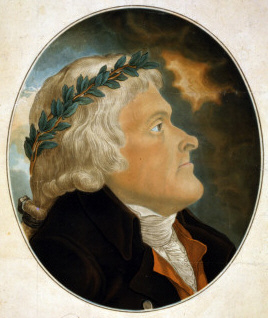Peace and Safety For Your Twentieth of June! – “Outlines”
Peace and Safety to the Epicureans of today, no matter where you might be!
Epicurus advised us to prepare outlines to assist in our understanding of true philosophy. Last November I wrote a post on Thomas Jefferson’s personal outline of Epicurean thought, as he wrote about it in his letter to William Short. This is a good idea for all of us to do, for the reasons Epicurus described in his letter to Herodotus:
“I have myself prepared an epitome of the whole system, Herodotus, to preserve in the memory enough of the principal doctrines, to the end that on every occasion they may be able to aid themselves on the most important points, so far as they take up the study of Physics. Those who have made some advance in the survey of the entire system ought to fix in their minds under the principal headings an elementary outline of the whole treatment of the subject. For a comprehensive view is often required, the details but seldom.”
The Facebook Epicurean Philosophy Group provides a great resource for allowing us to compare notes on practical issues in applying Epicurean philosophy. The format there, however, is primarily the posting of links to articles and comments on detailed issues. If we rely exclusively on those discussions, we may fall into the habit of thinking only about the details without ever integrating them into a coherent whole that we can use every day.
In another post (A Refresher On Epicurean Basics) I posted about Jefferson’s comment that he had what amounted to a personal “reboot sequence” that he used when confronting philosophical questions and errors. Much as we ourselves ought to react to the posts on Facebook, and the things we hear in everyday life that are filled with stoicisms and other anti-Epicurean thoughts, we need to be sure we have personal framework to which to return to reorient ourselves whenever needed. This is much as Jefferson described his own reaction to letter from John Adams which was filled with religious and philosophical error. Jefferson wrote: “Its crowd of scepticisms kept me from sleep. I read it, and laid it down: read it, and laid it down, again and again: and to give rest to my mind, I was obliged to recur ultimately to my habitual anodyne…..”
Jefferson’s “habitual anodyne” was what we might think of today as a “reboot sequence” to clear the mind of error and reset the thought process. Jefferson set it out this way:
“I feel: therefore I exist. I feel bodies which are not myself: there are other existencies then. I call them matter. I feel them changing place. This gives me motion. Where there is an absence of matter, I call it void, or nothing, or immaterial space. On the basis of sensation, of matter and motion, we may erect the fabric of all the certainties we can have or need.”
This “habitual anodyne” proves the essential epistemological base from which we can proceed immediately to remind ourselves of the rest of the philosophy, as Jefferson did for himself in his letter to William Short.
These thoughts come to mind today because I sense that it is a good time for me to summarize again what I think are the key points of Epicurean philosophy that apply in any situation. I’ll do that in a separate post, but I encourage others to do the same and share those on Facebook. We have the best of incentives to do this. What more do we need than the direct advice of Epicurus and the personal example of Thomas Jefferson?
_________
As Seneca recorded: Sic fac omnia tamquam spectet Epicurus! So do all things as though watching were Epicurus!
And as Philodemus wrote: “I will be faithful to Epicurus, according to whom it has been my choice to live.”

